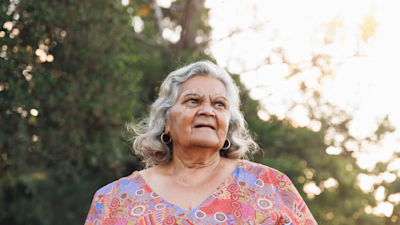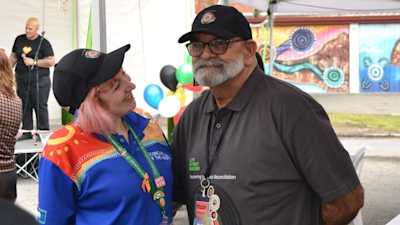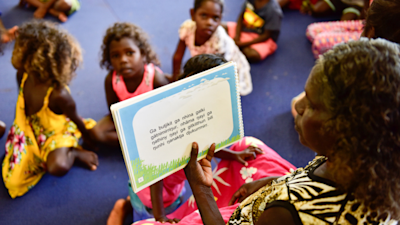"I am so happy and having the best time being taught by my elders, in my community, surrounded by family."
Hudson* has been on a journey to return home to Country and kin. He has shared some of that journey with us.
"When I think about it, I get a little confused. Why did I have to leave? I’ve stayed at so many different places, the people are nice, but it is never for long. And I miss my family and Country. I have missed so much school too, it’s not fair."
"My name is Hudson, I am a proud Adnyamathanha boy. I want to live with my family on my Yarta (homeland), where I am the happiest being surrounded by my family, culture and community," Hudson said.

Image: Hudson on his homeland with Cultural Grandfather.
"[The Department] didn’t think that this home was right for me as my Aunty runs a hotel and there was no school close by."
"I was allowed to visit my family but when I pack up my things, it feels like I am leaving a part of myself behind. I was so sad, when I had to return to foster carer who was not family I would cry for hours."
"I was lucky my Aunty wanted to look after me. She fought for me to come back to Country, back to family."
"Aunty had everything planned out. She had people coming every two weeks to talk to me about my feelings and it didn't cost anything."
Near the town where Hudson's Aunty lives, there were doctors and dentists. She was also able to organise School of the Air** for Hudson.
"It was cool because I could learn at home," shared Hudson.
"She even wanted to hire a governess – I don’t really know what a governess is, but it’s someone to help me with school and when Aunty was at work. Aunty said she would take me to see other kids and families in the community every week!"
"Even with all this stuff, the Department didn’t think that the school would support me living in the community. It’s not fair."
"Aunty even had a friend to offer to take care of me. He's nice, but he's not family, and he's not Aboriginal like me. The Department said they might let him be my carer, though. I was worried."
This is when Life Without Barriers stepped in.
Lisa Woods, State Manager Aboriginal and Torres Strait Islander Practice and Partnerships at Life Without Barriers, worked with Hudson and his family. Lisa said that as nice as the offer was for Aunties friend to care for Hudson, he was not family and would go against the Aboriginal Child Placement Principles.
“I expressed my concern for Hudson’s social and emotional wellbeing." Lisa said.
"He is extremely happy and content when he is back on Country, surrounded by family, community and emersed in culture."
"He becomes highly distressed and withdrawn when he was separated from his family and had to return to foster care. He was grieving and longing for family, culture and Country,” Lisa shared.
"Why do I have to go? Why won’t they let me stay? Aunty and my grandparents are worried about me too. She says all this moving isn't good for me. It's hard to make friends and feel safe when you're always leaving."
"I really wanted my family. I asked my carer to promise not to send me to live with anyone but my family."
Life Without Barriers requested a meeting with the Department, the Principal Aboriginal Consultant, and the Aboriginal Lead Practitioner and the team were able to demonstrate two-way cultural governance by capturing the voice of Hudson, his family, Aboriginal staff, and Non-Aboriginal Leadership.
Life Without Barriers strongly advocated for Hudson to return to family in the context of the Aboriginal Child Placement Principles and the four building blocks of the Family Matters Report. These are crucial steps in the pathway towards all Aboriginal and Torres Strait Islander children enjoying their right to grow up safe and cared for in family, community and culture.
"There was a big meeting with some important people. They were deciding what to do with me, where I should live," said Hudson.
"Life Without Barrier staff told them all about my story, and Aunty. They even showed pictures of me with my family and talked about why I should be with them. They talked about rights and laws, but all I want is to be with people who care about me."
Following lots of back and forth and robust debate about Hudson’s best interests and his right to grow up in culture, connected to family and Country, the Department made the decision to support Hudson returning home to family.
"I went home in March!" Hudson shared.
"I asked Aunty if they were going to make me go away again. She said no, you’re staying with us now."
"So, I don’t have to cry anymore. I hugged Aunty so hard. I stayed with Aunty for a while, and she did a great job connecting me with culture, family and community."

Image: Hudson on Country sitting next to the campfire.
"Aunty showed me cultural sites, she taught me bush medicine, she showed me how to cook and prepare kangaroo tail in the fire," Hudson said.
"Aunty showed me sites and taught me my Language, Yura Ngarwala! Adnyamathanha language, these are the things I didn’t know living in the city but now I’m learning more everyday. Yura Muda! My culture, language and ways."
“I need to learn from my elders and then look after them, coz they looking after me.”
"My grandparents, my kin, are able to look after me. So now I am living with them and I am so happy and having the best time being taught by my elders and standing strong and proud in my culture."
*Names have been changed to protect the children in this story.
**The School of the Air is a unique Australian Correspondence school using a combination of traditional correspondence teaching methods complimented by cutting edge technology.


